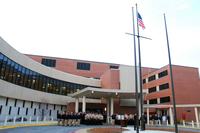It's no secret that, as Secretary of Defense, Donald Rumsfeld has long clashed with the Pentagon's top uniformed officers. A quick win in Iraq has given Rummy the chance to clean house.
Yesterday, President Bush named two Rumsfeld picks to the Defense Department's highest echelons. Collin McMillan -- a New Mexico oilman and assistant to then-Defense Secretary Dick Cheney -- has been tapped to become the Secretary of the Navy. And Air Force chief James Roche will move become Secretary of the Army.
"Roche is an extremely intriguingand, to any senior Army officer, an equally shockingcandidate for the job," says Slate's Fred Kaplan.
First, he's a 23-year veteran, and retired captain, of the Navy. Second, for the past two years, he's been secretary of the Air Force. It's unusual enough for Rumsfeld to appoint a service secretary who's had no experience with the service in question. It's a blatant poke in the eye to pick someone who comes from a rival service. It's a poke in the eye and a kick in the groin to name someone who's built up years of allegiance to two rivals.
(What's more), Roche has been closely associated with a group inside the Pentagon that the Army top brass deeply abhors. This group advocates remaking the militaryand especially the Armyinto a lighter, faster fighting force.
More changes in Army leadership are on the way, soon. According to the Baltimore Sun, Rumsfeld is pressing the President to name U.S. Central Command chief Gen. Tommy Franks as the replacement for Gen. Eric Shinseki as Army chief of staff.
During his tenure, Shinseki frequently tangled with Rumsfeld and his staff, the paper says.
Shinseki helped sidetrack Pentagon plans to cut two of the 10 active-duty Army divisions in 2001. Last year he fought -- and lost -- a battle with Rumsfeld over the long-range Crusader artillery system, which Rumsfeld said was obsolete and too heavy to be placed aboard aircraft and sent into battle.
When Shinseki suggested this year that it might take "several hundred thousand" troops to occupy Iraq, he was rebuked by the Pentagon as being "wildly off the mark." About 125,000 U.S. ground troops are in Iraq, a figure the Pentagon hopes to drastically reduce in the coming months.
THERE'S MORE: It's ironic that Shinseki was sacked, Phil Carter notes. Shinseki "has pushed harder than any officer in the Pentagon" for the modernizations Rumsfeld is seeking, and "he's been doing it since 1999, before Rumsfeld came to town."







